Table of contents
Monday, 24 Oct 2022: Mind your (ahem) MANRS
And for the 85th time, we’re all together again! We’re back in South East Europe for the first time in seven years, since RIPE 71 in Bucharest. As always, the first half of the first day of a RIPE Meeting is relaxed – catching up over coffees, attending a tutorials, and for our 300 plus newcomers, learning about the difference between RIPE and the RIPE NCC, among other things!
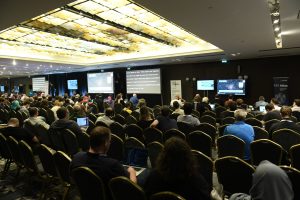
We’re back together again (for the 85th time!)
The Opening Plenary saw the RIPE Chair Mirjam Kühne welcome attendees back, along with the hosts of RIPE 85 Dr. Nenad Krajnovic, CTO and founder of SOX, and Zarko Kecic of RNIDS. Along with the RIPE Meeting and accompanying social events, our wonderful hosts pointed out that they also arranged for excellent weather ;) Hans Petter Holen, RIPE NCC Managing Director, shared an overview of the meeting’s logistics, followed by an administrative presentation on the NRO NC election. If you would like to vote in the NRO NC election, make sure you’ve registered and checked in ahead of the deadline!
Formalities and pleasantries, Programme Committee Chair Franziska Lichtblau got the show on the road. Tobias Fiebig provided a stark reality check with his presentation ‘13 propositions on an Internet for a Burning World’. As the world burns (somewhat literally with the heatwaves in France this summer among other things), Tobias presented 13 propositions, under four parts, “Care and Centralization,” “What’s Coming,” “The Way,” and the aptly named “What’s Next?”. He ended with a strong message – it is up to us to make the world a better place for everyone!
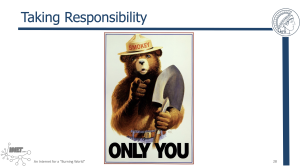
Yes, Tobias really means YOU!
From improving the world, we were reminded to mind our, ahem, MANRS. Andrei Robachevsky of ISOC reflected on the challenges and successes of the eight-year-old Mutually Agreed Norms for Routing Security (MANRS) initiative, which aims to provide fixes to reduce the most common routing threats. And remember, elbows off the table (even at RIPE Meetings!).
Slobodan Markovic, Vesna Manojlovic and hvale vale and other panellists took us back to Belgrade in the year 1997. If you want to hear first-hand accounts of building the Internet in a chaotic and oppressive time, and understand the crucial role it played, watch the discussion in the archives!
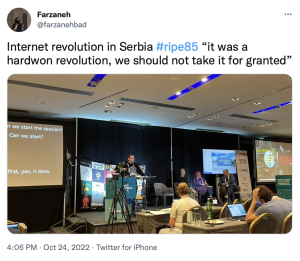
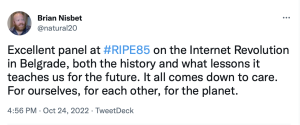
Brian and Farzaneh capture the mood of the day in their tweets
MANRS emerged as a clear theme on Day One, with the BCOP Task Force determined to make the RIPE community mind its Ps & Qs. As Kevin Meynell of ISOC pointed out, interestingly enough, that there is no clear standardised definition of a “bogon” in RFCs. Douglas Adams did however ensure that we all have a clear understanding of Vogons (and their poetry). If you want to read some truly awful poems, it might be time to thumb through the HGTG again.
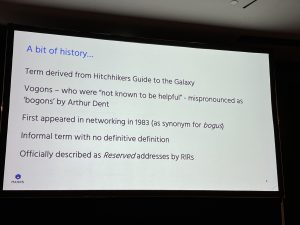
If you’ve never read Vogon poetry, (our legal team insists we add this) we’re not responsible for the next seven lines of this blog:
“Oh freddled gruntbuggly,
Thy micturations are to me
As plurdled gabbleblotchits on a lurgid bee.
Groop, I implore thee, my foonting turlingdromes,
And hooptiously drangle me with crinkly bindlewurdles,
Or I will rend thee in the gobberwarts
With my blurglecruncheon, see if I don’t!”
(Courtesy of the Wikipedia page on The Hitchhiker’s Guide to the Galaxy, the author of this blog packed a towel instead of the book!)
Meanwhile, the BoF on engagement in Eurasia post February 2022, moderated by Töma Gavrichenkov, addressed the geopolitical complexities and the current reality of the former ENOG meetings – with a range of opinions shared. Dmytro Kohmanyuk pointed out that things change and what was a good decision a decade ago might no longer be the case. While many spoke about the reasons behind decisions made in the past, there seemed to be general agreement that the way forward is more likely to be based on NOGs and national interests rather than regional meetings based on common languages.
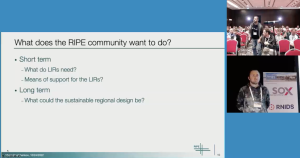
Some rather difficult questions at the Eurasia BoF for us to mull over as a community
In short, Day One of RIPE 85 wasted no time at all – delving into trying to save the world, better MANRS, building the Internet under oppression, and the future of cooperation in the shadow of war.
Tuesday, 25 Oct 2022: IPv6 and the partial solar eclipse
It was an early morning, yet many attendees showed up in the first Plenary of RIPE 85 day two. The day started with great presentations that our PC (don’t forget to vote!) carefully selected for us.
In the first Plenary session, Matthias Wichtlhuber presented his research about the IXP Scrubber. It is a Machine Learning (ML) based system for detecting and filtering DDoS traffic at the core of the Internet at Internet Exchange Points (IXPs) which see large volumes and varieties of DDoS. His findings generated a great discussion about cybersecurity and the accessibility of the system.
Coming next, Valerie Aurora talked about best practices and challenges of establishing Codes of Conduct (CoCs) in technical communities. She made an interesting comparison between CoCs and MANRS/RPKI, since both are fundamentally about helping communities establish and enforce agreed-upon behavioural norms.
The audience asked about the challenge of balancing the need for transparency and accountability versus confidentiality. Valerie’s response was that what people need to know through transparency reports is whether the CoC is enforced fairly and whether they can feel safe in this community. Good food for thought!

Leandro Bertholdo wrapped up the first Plenary of the day with his presentation on the asymmetry of Internet eXchanges Points. His research revealed that up to 24% of ASes avoid exchange traffic over the IXP and 28% of IXPs paths are prepended. One of the other findings was that small content providers are disconnecting from IXPs to connect to major transit providers.
There was also a surprise guest at the RIPE Meeting in Belgrade, a partial solar eclipse that many had a chance to capture. A great present from the hosts!
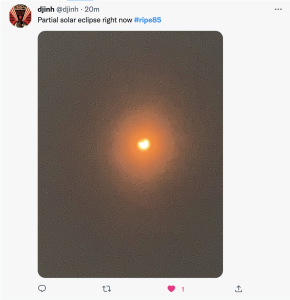
In the next panel, some of the organisers and participants of the first World IPv6 Day reunited to discuss the turning point events from 2011 and 2012, as well as commentary about the adoption of IPv6 over the past decade. The world IPv6 reunion tour began in Quebec at NANOG 85 back in June, then on to Singapore for APNIC 54 in September, and today the third and final instalment took place right here at RIPE 85. This time, Jan Žorž, John Brzozowski and Sander Steffann – who’ve been moderating these panel sessions throughout – sat with Jen Linkova, Christian Kaufmann, Peter Stevens, and David Miles. They looked at the ‘average’ growth in IPv6 deployment over the past decade, shared implementation stories, and discussed how best to bring IPv6 to the dark corners of the IPv4-only Internet. They also got into the push for IPv6 on by default, the need to properly test IPv6 only by turning off IPv4, and how the rising price of IPv4 is perhaps one of the things most likely to accelerate the slow but inevitable global transition to IPv6.
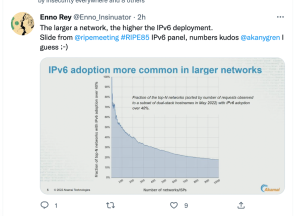
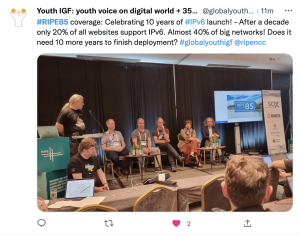
The plenary sessions resumed in the afternoon with Ivana Golub presenting on the development of network technologies and services within the GÉANT project. The aim of the project is to ensure equal network access for all scientists across Europe to research infrastructures and e-infrastructure resources. Ivana shared that the project had 500 contributors and benefited 50 million users.
One of the services of the GÉANT project, perfSONAR, was the subject of the following presentation by Andrijana Todosijevic, Katarina Simonovic, who reflected on 20 years of use of this service. perfSONAR stands for “performance Service-Oriented Network monitoring Architecture” and was created to monitor and ensure network performance.
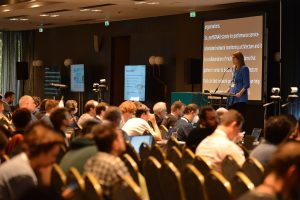
Andrijana shared an interesting use case between the Hawaii Institute of Astronomy and Queen’s University in Belfast, who used perfSONAR to speed up data transfers between the two institutions as part of the ATLAS project (not the RIPE Atlas).
The session ended with lightning talks by Branimir Rajtar on the birth of NOG.HR in Croatia, Lefteris Manassakis on an open-source tool to detect BGP prefix hijacking. Finally, Wolfgang Tremmel, who co-chaired the panel, put his presenter hat on and talked about RFC9234 which deals with the assignment of roles to BGP neighbours.
In the last Plenary of the day, Geoff Huston gave a ‘quick’ tour to QUIC, a transport-level framing protocol that offers applications access to the basic IP datagram services offered by IP through the use of UDP. Following this presentation, we were immersed in the journey of how to bring a new fiber network to your home. Rinse Kloek gave insights into the process of designing and engineering a new FTTH Access network using the latest XGS-PON technology to be able to deliver up to 8 Gigabit symmetrical speed to the end users.
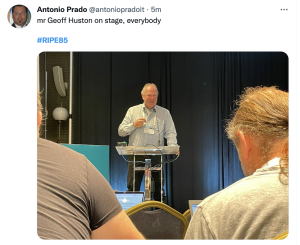
Finally, we wrapped up Day 2 with the Quantum Internet Community Meetup, and the BoF on mitigating the impact of sanctions on the Internet. Ivana Golub led the discussion in the Quantum meetup and presented an overview of Quantum technologies and Quantum Internet Activities in Europe. Afterwards, Vesna Manojlovic invited everyone to participate in the upcoming Quantum Internet Hackathon that will take place on 1-2 December in Amsterdam, Dublin, Tashkent, Padua, Poznan, Sarajevo and online. Following that Mick O’Donovan talked about Quantum Communications in Ireland and the participants also discussed their motivation to engage in Quantum Internet activities.
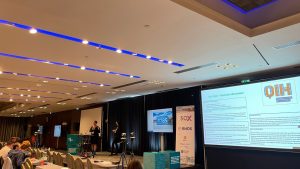

Meanwhile, the attendees of the BoF discussed the impact of sanctions on RIR’s services, access to Internet resources, and on network operators’ work. They also discussed the available policy solutions such as transparent compliance processes, sanctions waivers for necessary entities running the Internet, cross-industry coalitions and others. The BoF continued with a dynamic discussion on compliance with the law while preserving the global Internet, the role of RIRs in this, and the need for more effective sanctions. That was a weighty topic for the end of the day, but it also gives a platform for the participants to discuss during the social event. On Wednesday, the Working Groups will start their work, and we’ll see more discussions and proposals to come.
Wednesday, 26 Oct: Let the Working Groups Begin
After a late night of dancing, two parallel tracks of the RIPE Working Groups (WGs) kicked off the Wednesday sessions – here’s a rundown.
Routing WG
Alexander Azimov and Eugene Bogomazov opened the session and explained route leaks, their impact, and using the BGP roles and Only-to-Customer (OTC) attribute from the recent RFC 9234 to prevent them. A key aspect of OTC is that it does not require configuration; it is handled by software. Massimiliano Stucchi came up next and presented his analysis of the data in the Internet Routing Registries (IRRs). This included how data in authoritative IRRs by Regional Internet Registries (RIRs) compares to data in other IRR databases. His takeaway message was that using RPKI data is more reliable, we should encourage the use of RPKI, and legacy space holders should be allowed to use RIR services and RPKI. For the final presentation, Marco d’Itri shared his review of RPKI Validators. The good news is that there are multiple maintained, high-quality implementations of RPKI validators. He argued that the 80% market share of routinator in data is very high and that there should be diversity in deployed software. This was followed by an explanation of the complexities of packaging rust software and his efforts in packaging various RPKI validators for Debian.
Address Policy WG (Sessions 1 and 2)
WG day started with two Address Policy WG sessions. James Kennedy gave an update from the NRO NC / ASO AC – everything’s basically fine in that department. Then a run through the open policy proposals here and in other RIR regions from the RIPE NCC’s resident policy guru Angela Dall’Ara who said she’d keep her presentation interesting by reading out each letter of every URL, but sadly changed her mind.
Some discussion of the open policy that seeks to ‘Remove Mandatory IPv4 PA Assignment Registration in the RIPE Database’ with what seemed (to this humble uninformed scribe) like support for the general idea with quite a few caveats that require more discussion on the list.
Marco Schmidt handled the the usual reporting from the RIPE NCC’s Registration Services Team. It looks like the current wait time for a recovered IPv4 /24 allocation is about two years. He asked if we should finally think about addressing the issue of multiple LIRs joining this two year queue, though Sander Steffann suggested the deck chairs have been sufficiently arranged by the WG by now. Other topics were the gradual exhaustion of the IPv4 pool that is reserved for assignments to IXPs – at the current rate it seems like this will last until about 2029 – is this long enough? And then asking if it’s time to revisit the definition of ‘assignment’ in the policies.
WG co-chair Leo Vegoda then continued asking the question first posed at RIPE 84 – is it time to have another look at the goals of the IPv6 policy and see if they’re still right for where we are now? There was some discussion here about the ability for LIRs to extend their allocations – the RIPE NCC reserves the next adjacent three bits when making an allocation – meaning that a network with a /32 can grow into a /29 and keep an aggregated block. Similarly from a /29 to a /26. This led to some discussion around whether this might be better publicised to reassure networks with plans to eventually expand, but that they can’t justify anytime soon.
In the open mic there was some discussion on the matter of ensuring the resources of our Ukrainian members are protected. This issue is probably too complex (and serious, and heartbreaking) to do it justice here. However it was encouraging to see RIPE continue to do what it does best – take a difficult problem and work constructively to identify potential solutions via the often-messy process of ‘rough-consensus’.
Open Source WG
Maarten Aertsen came up on stage and presented an initiative of the European Commission to improve cyber security by creating a “CE” mark for software and the concerns regarding the current proposal. Annika Hannig joined us remotely and talked us through the process of deploying critical infrastructure using the open-source tools Terraform and IX API. Annika gave a brief demonstration on how to use these tools to manage changes and where relevant API documentation could be found. The following presentation came from Lefteris Manassakis, who demonstrated how to do real-time BGP prefix hijacking detection using ARTEMIS, one of our favourite open-source tools that has twice been awarded the Community Projects Fund!
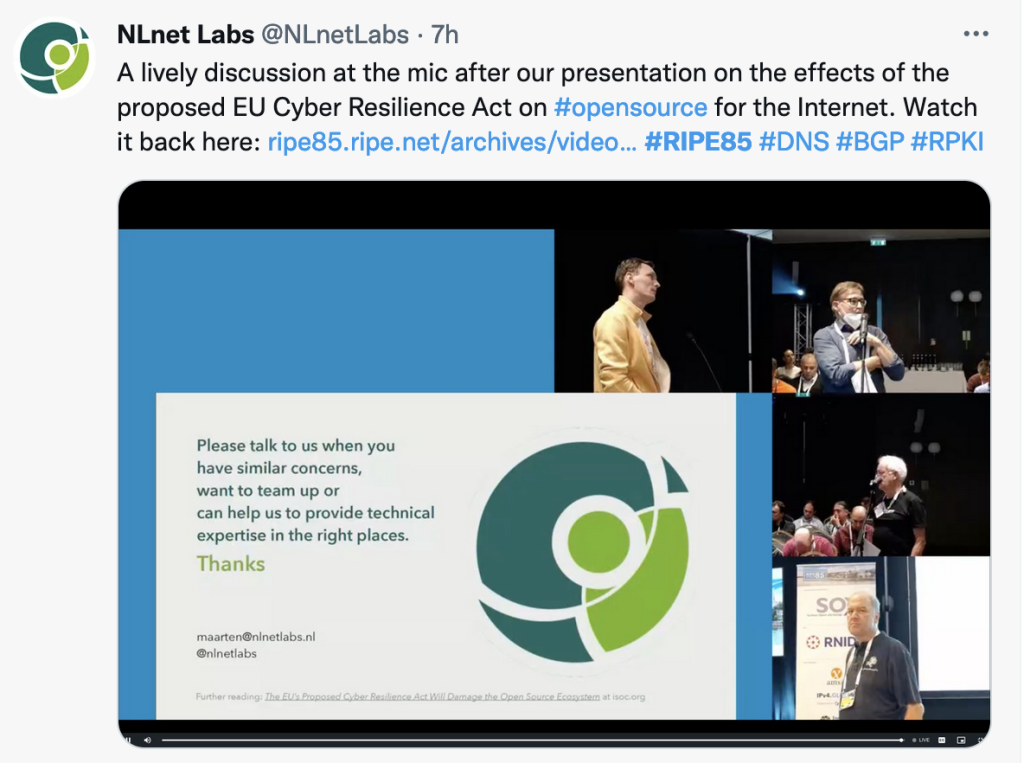
IPv6 WG
Raymond Jetten was selected for another term as IPv6 co-chair; congrats!! Pablo Camarillo gave the opening presentation and presented the recently added addition to the IPv6 packet header extension that records the trajectory of packets in ECMP networks. He also discussed potential use cases made possible by this feature. Pablo was followed by Nico Schottelius, who compared different NAT64 open-source implementations and asked the audience for feedback on any implementations he may have missed. One important finding was that although there are a lot of open-source NAT64 implementations for Linux, they are not as reliable as those in *BSDs, each with a single good and stable implementation. Finally, Ondřej Caletka presented an “IPv6-mostly” network that has been set up at this RIPE Meeting, which combines IPv6-only functionality for devices that support it, and traditional dual-stack for other devices, all in a single network. An interesting figure was that IPv6-only is best supported by Android and Apple devices, and 66% of RIPE Meeting attendees use one or the other.
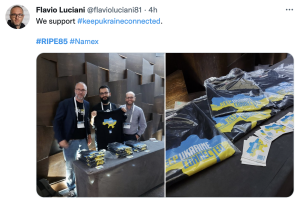
Connect WG
Thomas Delaby was the first to present in this session on applications for 400G Ethernet and shared technical insights on what implementors may expect. Particularly, he addressed the dangers of saturated EDFA, which causes channels to drop – saturation was highlighted as something to avoid actively. Maria Isabel Gandia came up next to share an update for the EUR-IX association and exciting news from Internet Exchanges internationally. Some highlights include TOP-IX celebrating 20 years, Espanix connecting their 5th POP, and LINX now having a 6Tbps+ peak and launching a collaboration with Kenyan IXAfrica. Afterwards, Arnold Nipper gave us an in-depth update on the PeeringDB product, a freely available database of interconnect data. The product updates included CDN improvement, API update and documentation, and new releases planned for March next year. Arnold also shared that the peering organisation actively seeks volunteers to help in their outreach, operations and administration. The session ended with a final remark from Sander Steffann, who described that the free space in the IPv4 pool is expected depletion in seven years according to current trends. The question was raised to the group to decide on the next actions and whether a new policy was necessary.
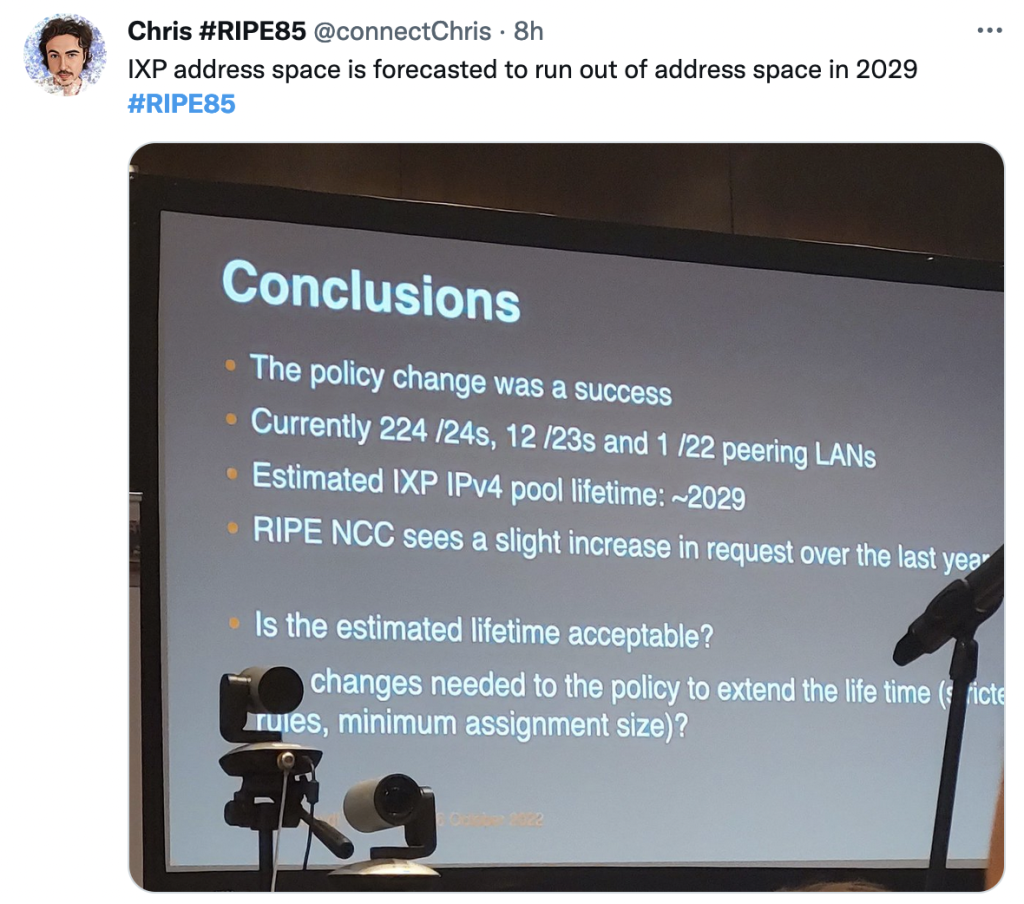
Interim
Just before the next WG session, our Quizmaster Gerardo ran a spooky Kahoot quiz on the RIPE Community! Congratulations to Robert for winning first place!
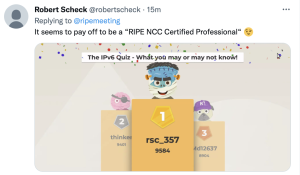
RIPE NCC Services WG
The ever-so-popular RIPE NCC Services Working Group closed this Wednesday’s sessions with a packed programme that exceeded the allotted time and almost overran the GM! Felipe Victolla Silveira presented the RIPE NCC operational update and mentioned that the high workload had now decreased, and the RIPE NCC had more time to focus on the quality of service compared to previous years. He also mentioned recent efforts to achieve a more compliant and accurate registry, including the new ‘% inaccuracy’ metric that measures member information against what’s in the registry during Assisted Registry Checks (ARCs). Felipe also mentioned recent work to make RPKI more secure and the new Publish-in-Parent feature. Fergal Cunningham gave an update on RIPE NCC’s efforts to increase dialogue and engagement. More videos, webinars, and experimentation with new formats, including the new RIPE Labs podcast (give it a listen – we think it’s actually kinda good!) and the RIPE NCC Translations Wiki, which is currently available in six languages. He also encouraged members to use the new RIPE NCC Forum. Athina Fragkouli then presented updates to the registry from distressed areas. She gave an overview of the current due diligence procedures and the general background, as well as the additional steps that could be taken to address this difficult issue. This included an additional disclaimer, freezing all updates or using a freeze button. Many questions and discussions followed her presentation, and RIPE NCC Board Chair Ondřej Filip told the audience that the Board would work on a temporary solution that would buy some time until a more permanent solution was found, as such a solution would require time-consuming policy changes. Finally, Kurtis welcomed Rob Evans back as co-Chair of the working group for another term. He also said that as the longest-serving chair of all the working groups, his term would soon come to an end and that he would not be standing for re-election. So, if you are interested in participating in the chairmanship of RIPE’s most beloved working group, keep an eye on the WG mailing list!
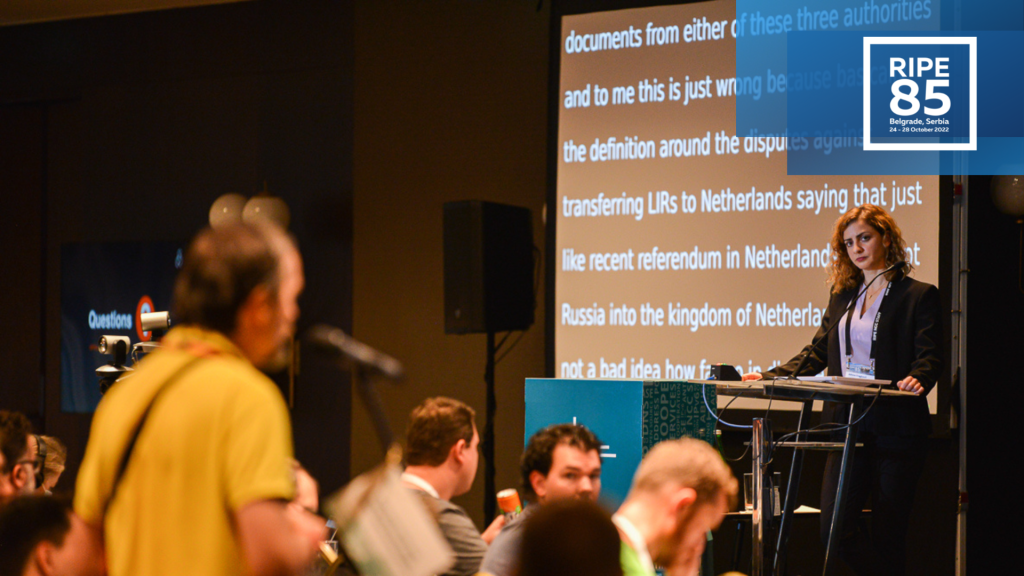
Wrap up
The Pasteis Interest Group (PIG-WG) took place once again, where people queued up to have one of the 30 Pastel de Nata on offer. We have yet to see a policy proposal from this WG.
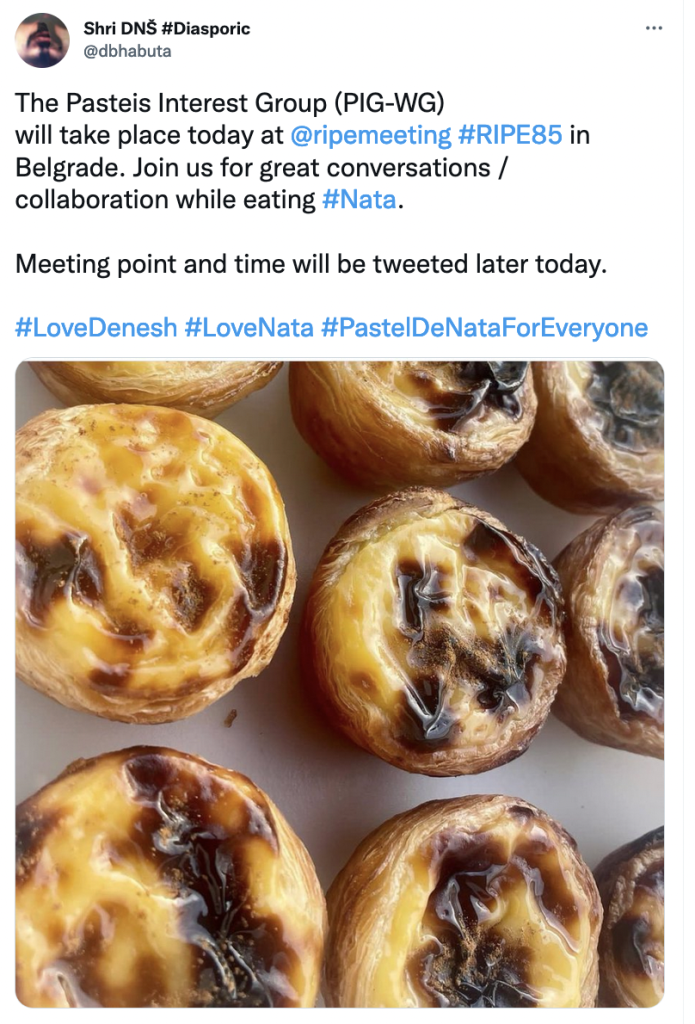
Even though the General Meeting is not part of this report, we welcomed the new Chair of the Executive Board, Ondřej Filip, for chairing his first session.

The day ended with a fully-booked tour (120 people expressed their interest!) of the Nikola Tesla Museum in Belgrade. We want to thank our hosts, Serbian Open eXchange and RNIDS, for organising these tours for us.
Some participants also arranged a visit to the local hackerspace in Belgrade, while rumour has it that there might have been a late Whiskey BoF arranged.
Thursday, 27 Oct 2022: Secret and Not So Secret Working Groups
After a good Whiskey BoF on Wednesday evening, Thursday began with two parallel RIPE Working Group (WG) tracks, continued with the Community Plenary and ended with the Diversity in Tech session.
Anti-Abuse WG
Kicking off Thursday morning, Gerardo Viviers, RIPE NCC talked about an Anti-Abuse RIPE NCC training webinar which is in the pipeline. The first session will be delivered to RIPE NCC members in January 2023 and Gerardo thanked everyone who contributed since it was a collaborative effort between the RIPE NCC, the community and the WG. He was followed by Co-Chair Brian Nisbet who spoke on the RIPE Database Taskforce Outputs and recommendations including “Publishing the legal address of the resource holders”. Patrick Koetter then shared an update about the Anti-Abuse Group “KG Abuse” in Germany. He went into how it’s developed over time, the cost of abuse and defining what abuse is. Finally, Johannes Gilger presented on the urlscan.io service, a URL scanning platform that lets you analyse suspicious URLs.
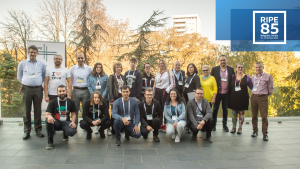
MAT WG
We then saw six talks in the MAT WG, beginning with Thomas Holterbach who spoke on the positioning of route collectors as vantage points and the goal of selecting BGP Vantage Points (VPs) that maximise utility and minimise the volume of data. Malte Tashiro then presented a tool that provides an alternative to the vantage point selection in RIPE Atlas, the goal being to eliminate bias and improve methodologies currently available to construct a probe set. Next up, Marcel Flores talked about investigating outages via BGP update messages. He and his team used RIS live to analyse the health of Edgecast’s CDN. Next up, Mariano Scazzariello showcased a demo of Kathará, a lightweight and Scalable Network Emulation System. By using a simple configuration language to describe a network scenario, operators and researchers can describe network scenarios in both topology and configuration. Valerio Luconi gave an informative talk quantifying the effects of the war in Ukraine on the performance of Ukrainian Internet. Using 800Gb of data from RIPEstat, RIPE RIS and RIPE Atlas, Valerio was able to uncover unique behaviour in BGP announcements, prefix splitting, BGP hijacking and Latency with strong correlation to the start of the war. Lastly, Qasim Lone provided insights on the use of 240/4 address space and validated its use by cloud providers.
DNS WG
Co-Chair João Damas began the session by presenting the charter of the new “DNS resolver Best Common Practice Task Force” which will work to produce a set of best practices for the operation of DNS resolvers. Shane Kerr, co-Chair, announced that he was stepping down from his role as co-Chair after many years of service and welcomed Willem Toorop as co-Chair. Luca Schumann presented on DNS over QUIC in the context of web applications. He was followed by Dave Knight (also a former co-Chair of the Working Group), who presented statistics on TLD registry delegation size constraints regarding name servers. Third in line, Arturo Filastò of the Open Observatory of Network Interference (OONI), presented results from the DNSCheck experiment, which measured the accessibility of DOH and DOT servers in countries with Internet censorship. The session ended with Balint Cersgo presenting Meta’s brand new DNS software, “DNSROCKs”, and a quick update on RIPE NCC’s DNS activities by Anand Buddhdev.
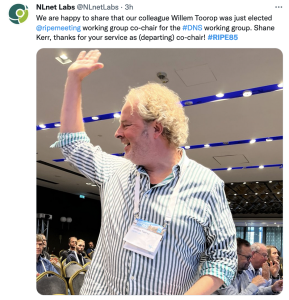
IoT WG
We saw three talks over in the IoT WG session all looking at the ongoing challenges around that notorious missing “S” in “IoT”. Michael Richardson talked about the dangers of wandering coke machines in our schools. How do we make sure these things are getting the right software updates on a timely basis so they don’t start doing weird stuff? Cryptography is the answer! Michael shared a document that gives a taxonomy of methods manufacturers use to install trust anchors and private keys on IoT devices. Peter Steinhaeuser also delved into the unsettling idea of devices with a life of their own suddenly going crazy. MUD files help by defining the expected behaviour of such devices, and in the talk we heard about using OpenWrt for creating just such files. Last up, Nick Allott took a deep dive into secure IOT gateways looking at industry challenges and potential solutions.
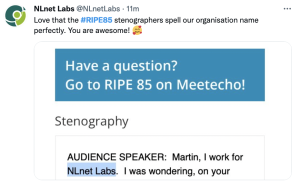
Database WG
Ed Shryane began with an operational update for the RIPE Database. He talked about the changes in the new whois release. Co-Chair William Sylvester summarised the discussion on the mailing list of geolocation and geofeed. It seems that there is a consensus on the general purpose of the geolocation but the wording needs to be fine-tuned and a proposal needs to be made.
The next topic, “2022-01 Personal Data”, was again presented by William. Both the presentation and the comments on the mic were aligned, that the proposal is too big and needs to be dropped and split into smaller proposals since the intent is good. They all thanked co-Chair Denis Walker for his contribution to the topic.
Cooperation WG
Dragana Ilic gave an overview of the telecom regulatory situation in Serbia. RATEL, the regulator, is working on a new law that would focus on stronger net neutrality protections, expanding broadband, new players that are not part of our traditional electronic communications market and preconditions for 5G auctions. Lauren Crean from the OECD presented their recent Report on Routing Security (BGP Incidents, Mitigations Techniques and Policy Actions). Lucien CASTEX presented on EU Scientific Foresight Unit study on Splinternets looking at what fragmentation was and an assessment of policy options. Bastiaan Goslings gave an update on the ITU Plenipotentiary meeting that took place over three weeks in October 2022 and involved over 2,000 participants from 193 member states. Finally, Chris Buckridge provided an update on UN developments.
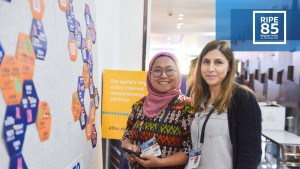
RIPE Community Plenary
RIPE Chair Mirjam Kühne gave an overview of the RIPE Chair Team’s achievements during its first two years, including an updated Policy Development Process, an updated Code of Conduct, RIPE Database Requirements Task Force recommendations, RIPE Task Forces definitions and guidelines, RIPE Meetings during the pandemic, promoting the RIPE community in various fora and increased outreach to new RIPE community members. A discussion about whether, how and how often the RIPE Chair team (or the RIPE NCC?) should continue to moderate RIPE mailing lists saw many participants take the floor to express a wide range of views. Mirjam then pulled back the curtain on the Secret Working Group, helping newcomers understand the provenance of this august group and encouraged others to join in the fun. She shared her personal views on the importance of not taking things too seriously and creating community through shared experiences and laughter. She also shared some of the poems, limericks and prose that exist in the RIPE Database as well as some past examples that the Secret Working Group came up with – including something about a plane crash and Hans Petter’s luggage getting lost during RIPE 40…Sounds like there’s a good story there!
Diversity in Tech
Finally we wrapped up day four with the Diversity in Tech session discussing practical changes that could be implemented to help make RIPE as open and inclusive as possible.
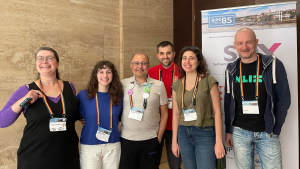
Friday, 28 October 2022: See you in Rotterdam!
And after a week of being warmly welcomed by Belgrade, we said goodbye on Friday. We loved seeing so many people onsite for our first RIPE Meeting in South East Europe since RIPE 71, and we were also thrilled to still see lively online discussions from our virtual attendees. But even though this was the shortest day of RIPE 85, we were treated to a full agenda of fascinating talks. Speaking of….

Plenary
After a late night of merrymaking at the RIPE Dinner, some of us may have had a slow start to the day. But the first plenary of the day, bright and early, still drew a number of us in to hear from our first speaker, Pavlos Sermpezis of Aristotle University of Thessaloniki, on unbiasing Internet measurements. Pavlos shared the results of the AI4NetMon Project, which aimed to quantify bias in Internet measurement platforms and then identify ways to reduce this bias. He specifically assessed the amount of bias in RIPE Atlas probe and RIS route collector deployment by assigning numerical values through the AI4NetMon tool. Then he used this tool to make recommendations for eliminating bias in these measurements. His suggestion was to use a subsampling algorithm to select an unbiased set of vantage points.
Next, Konstantinos Zorbadelos of Canal+ Telecom shared his team’s efforts to pioneer an open-source automation tool for BGP traffic engineering. As manual configuration is cumbersome and error-prone, they designed a new approach with features such as a centralised configuration point, standardised BGP policy configuration tools and proper prefix tagging. He also reminded attendees to mind their MANRS, and their ROAs and balance flexibility and security needs when automating BGP announcements.
Following these speakers were two lightning talks. Oksana Prykhodko of iNGO European Media Platform presented on behalf of Hostmaster. Ltd.’s Svitlana Tkachenko. Svitlana’s presentation showed the experience of Hostmaster Ltd., the .UA ccTLD, during the invasion of Ukraine. They had personally endured attacks that destroyed their equipment, and nationwide a quarter of all networks were lost. Blackouts and network interruptions were another major difficulty for their operations. Svitlana’s presentation expressed thanks for the efforts of the Global NOG Alliance and initiatives such as Keep Ukraine Connected while affirming her and her colleagues’ commitment to maintain Ukrainian networks.
Daniel Wagner of DE-CIX concluded the session by sharing his team’s experience setting up P4. After several tickets with the help desk to set up documentation and get the right scripts, the right server and a transceiver compatibility list, the team finally had it up and running, and Daniel expressed hope that his presentation would help others have a smoother experience.
Closing Plenary
The closing plenary was kicked off by Emil Košić of Sartura, who explained Replica.One, an open-source Gentoo-based firmware build system. The platform is designed to accelerate the service ecosystem and supports open-source and third-party applications for multiple use cases.
Next, we were treated to three lightning talks. Peter Hinrich of SURF explained the intricacies of the quantum Internet to attendees and shared what the Quantum Internet Alliance had been up to. Their goal was a fully programmable quantum network prototype, and he invited the audience to try out the Quantum Network Explorer to explore use cases. Next up was Oleg Basistyy of VPN Generator. Oleg stressed the necessity of VPN access in countries facing Internet censorship. He argued that VPNs should be viewed as access technology and that there needed to be a Captive Portal RFC 8952 for VPNs, just as there had been other RFCs aimed at combatting censorship. Next, Massimo Candela of NTT wrapped things up with a talk on the importance of monitoring BGP and RPKI operations. He suggested the use of PacketVis.com, which was BGPalerter as a service.
Sjoerd Oostdijck then delivered the Technical Report for the RIPE NCC. He gave a behind-the-scenes look at what the RIPE NCC’s technical teams had faced in setting up the meeting, including the theft of necessary tables by a wedding party, and shared some successes, such as the fact the WiFi was now IPv6-mostly.
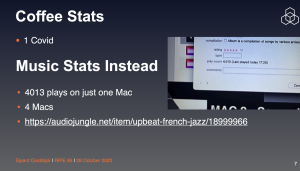
Some important meeting statistics
RIPE Chair Mirjam Kühne closed the meeting. She shared some statistics about meeting attendance and some highlights about the meeting. There was a new Task Force, the Public Resolver Best Practice Task Force, which aimed to draw up guidelines for a public resolver. In the NRO NC election, James Kennedy was re-elected for a three-year term, and Antonio Prado and Moin Rahman were elected to the RIPE Programme Committee. Mirjam also thanked outgoing working group chair Shane Kerr and congratulated newly selected chairs.
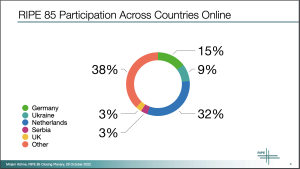
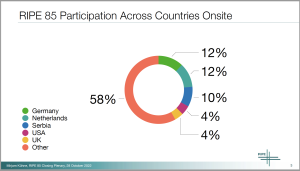
We were pleased to see such international attendance!
Next, a mysterious group took the stage. They brought a lot of laughs to the group and raised an interesting question: if a hypothetical secret working group in fact existed, and was publicly discussed in the community plenary, would it really be secret anymore? A purely philosophical question with no basis in reality, of course.
As one attendee gleefully shouted, please turn up the encryption!
That’s all for now! Except for one thing: can anyone tell us what Splat is?
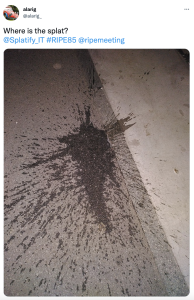
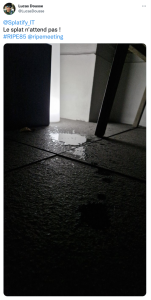
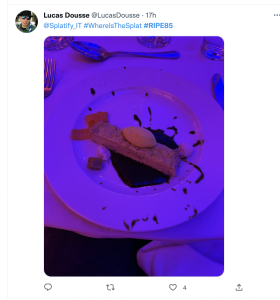
Missed the action?
View the archives!

